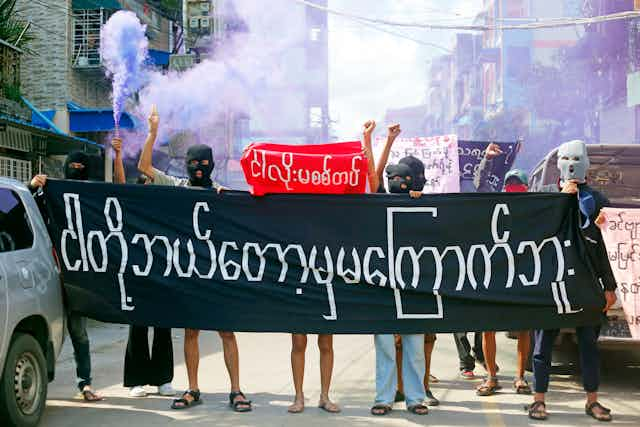The execution of four political prisoners in Myanmar is further confirmation of what was already well known. The regime of Commander-in-Chief Min Aung Hlaing will stop at nothing to maintain its grip on the country.
Since its coup in February last year, the military has used terror to assert control: extrajudicial killings, torture and the arbitrary arrest and detention of protesters. It has murdered civilians, tortured children and condemned the country’s elected leaders to long terms of imprisonment following farcical show trials. More than 1,600 people, including at least 75 children, have been killed.
The executions make a political solution to the crisis, already dim, virtually impossible. Opponents of the military, the People’s Defence Force, have renewed their commitment to using whatever means they have – including attacks, assassinations, and bombings – to overturn military rule. Peaceful protest, once championed by Aung San Suu Kyi, is no longer the modus operandi of many dissidents.
Of the country’s many armed ethnic groups, some have reportedly begun negotiating peace talks with the military. However, many others have aligned themselves with the Peoples Defence Force, and are providing weapons, protection and training to those fighting against military rule.

The country trembles on the brink of civil war. Its existing problems – poverty, sickness, a lack of fuel, food and medicine – have brought the country to crisis point.
Western powers seemed shocked by the suddenness of Myanmar’s return to brutal military dictatorship after almost a decade of a seemingly promising new quasi-democracy. In truth, although Myanmar adopted some of the trappings of multi-party democracy in the nationwide elections of 2015 and 2020, the military retained its role as the central political player.
After 2011, the military waged a brutal campaign of civil war against the Kachin in the North of the country. In 2016 and 2017, it carried out deadly clearance operations against the Rohingya in Rakhine state. In both cases it used devastating violence against civilians. No one ought to have been surprised when it applied the same methods to protesters following last year’s coup.
Strong words, little action
The response of Western governments has been weak. Bewilderingly, and almost alone among Western countries, Australia has still not sanctioned Min Aung Hlaing.
Early images from Myanmar after the coup showed crowds of people holding placards begging for the Security Council to implement the UN’s principle of Responsibility to Protect by authorising humanitarian intervention to protect the lives of civilians. But the Security Council is hamstrung by China and Russia’s support for Myanmar’s generals.
The UN General Assembly passed a strong resolution in June 2021 calling for an arms embargo and other measures. But the General Assembly has no power to enforce its resolutions. Unlike in Ukraine, the people of Myanmar have not been provided with weapons to fight for their lives.

Two months earlier, the Association of Southeast Asian Nations (ASEAN), of which Myanmar is a member, attempted to negotiate an end to the crisis. It was not successful. ASEAN’s Five Point Plan called for an immediate end to violence in the country, dialogue among all parties, the appointment of a special envoy to immediately visit Myanmar, and humanitarian assistance.
Having agreed to the plan, Min Aung Hlaing almost immediately announced the military would continue using violence until the protests stopped. There is no platform for building trust between the parties.
The executions confirm to those opposing the military that Myanmar’s “Spring Revolution” is a battle they must win. The cost to Myanmar will be very high and will be paid by generations of Burmese people. And countries in the region, including Australia, will also pay a price.
What Australia must do
War creates the conditions in which the gravest of human rights abuses flourish. When the level of suffering inside a country becomes intolerable, the result is a flow of refugees and even greater exploitation of those vulnerable to practices like human trafficking. These problems will arrive on Australia’s doorstep. For that reason alone, Australia should do much more to assist the people of Myanmar.
First, it should impose targeted sanctions on the coup leaders, including Min Aung Hlaing. Other countries imposed targeted sanctions in response to atrocities carried out against the Rohingya back in 2017. If Australia’s failure to follow suit was part of a strategy to facilitate the repatriation of Australian economist Sean Turnell, who has been held in Insein Prison since the coup, then an urgent rethink is needed.
Read more: Can the world stop Myanmar from becoming a failed state?
Second, the Australian government should consider recognising the National Unity Government, which represents the democratically elected parliament and those who oppose the coup. The execution of a member of the former parliament confirms, if confirmation was necessary, that the military has no claim to legitimate rule.
Finally, Australia should ensure its humanitarian response to a crisis in a country in the region at least matches the generosity of its response to Ukraine, and that funds for aid and relief are channelled through the National Unity Government.

